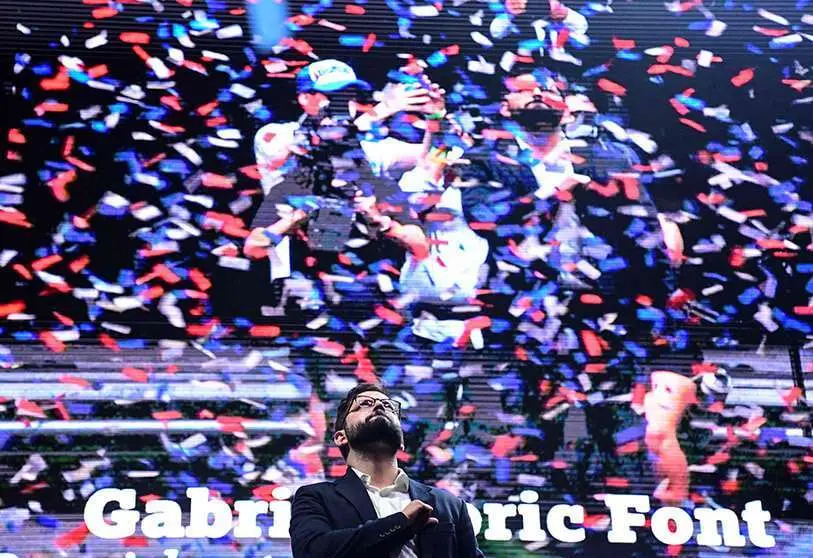The ultra-left touches the skies of power in Chile

Gabriel Boric Font, son of a Croatian and grandson of a Catalan, did not need to storm the skies of power, but only to win at the polls over his ultra-conservative rival, José Antonio Kast, who barely more than halfway through the vote count admitted his defeat: "As of today Gabriel Boric is the president-elect of Chile and deserves all our respect and constructive collaboration. Chile always comes first", read the first public message from the defeated Kast after phoning Boric to congratulate him personally.
The gesture contradicts the gloomy predictions of those who predicted that the candidate who advocated law and order as a guide for his political action would not recognise the results and would try all kinds of manoeuvres, in the manner of Donald Trump, to avoid recognising the election result. At the same time, it relieves the Chilean electorate itself, which is much more focused than its own political leaders, and which had been dragged into extreme polarisation.
However, the triumph of the candidate of a coalition that includes the Frente Amplio and the Communist Party, immediately greeted with jubilation by Brazil's Lula da Silva and Pedro Sánchez, among others, has not erased this radical division in a Chile forced to decide between two radically different models of a country. With the left-wing candidate triumphing, the main question now will be whether his radical reforms will be imposed anyway or whether some kind of consensus will be sought with the battered political forces of the centre.
Boric is the legal minimum age to be president of the country: 35. He brings together a new generation of young people who will take the reins of the country and their own destiny. His first task will mark everything that comes after, namely whether or not to reconcile with the previous generations, whom they have been quick to disqualify in recent years. They referred not only to their guilt for having lived under the dictatorship of Augusto Pinochet, but also for having played a leading role in the political transition that followed the dictator's ouster after he lost a referendum that he himself had called. This political transition, grouped in the Concertación de Partidos por la Democracia - an alliance made up of Christian Democrats, Christian Socialists and Socialists - which had enabled Chile to become the most advanced and prosperous country on the Ibero-American continent, has been virulently disqualified, especially since the social outbreak of 18 October 2019.
Gabriel Boric, who, in barely a decade, has gone from presiding over the Federation of Students of the University of Chile to the highest office in the land, finds himself with institutions weakened and delegitimised by those who have accompanied him in his adventure to demolish the system. Both the Chamber of Deputies and the Senate, where the political forces of the left and the right are practically on a par, could be completely pulverised by the current Constitutional Convention, which is due to present a draft of a new Constitution in the second half of 2022, to be submitted to a referendum. The overwhelming dominance of the left among the constituents could make a clean sweep and thus accentuate political polarisation.
There can be little doubt that those who have raised Boric to the presidency will also demand immediate results in the implementation of his radical reforms: free and universal public health and education; cancellation of loans granted to university students to finance their careers; elimination of the private pension system; and a sharp increase in taxes "on the rich" to finance this gigantic plan for change. In short, more state and consequent complete abandonment of the liberal political-economic model established along the lines of the so-called Chicago School.
Anyone can subscribe to a programme that a priori should lead to greater general welfare and a progressive disappearance of inequalities. But, in the case of a Latin American country, there are already too many lacerating examples of what many of them have ended up with when they have been managed by the extreme left. Chileans themselves claim to have a different political culture and tradition, which will enable them to successfully counter the foreseeable attempts of the Castro-Chavista axis to bring them into its orbit. A similar presumption, by the way, that the Venezuelans boasted of when Hugo Chávez, after winning the elections and disqualifying those who saw in his ways a totalitarian impulse, has resulted, among many other things, in more than five million exiles. Many of them survive today in a Chile whose immigration avalanche has turned its traditional welcome and hospitality into intransigence and hostility, another serious problem that Boric will have to address without delay.
It would undoubtedly be magnificent if Chile were to achieve its goals of well-being and peaceful coexistence in an alternation in accordance with the most orthodox democratic parameters. It would become a great model to imitate and follow. And it would disprove Karl Marx's statement in 1871 to his friend Ludwig Kugelman that "heaven is not taken by consensus, it is stormed".

